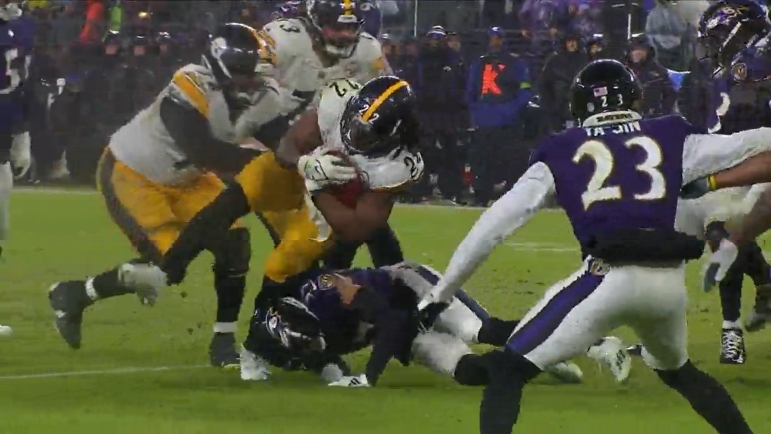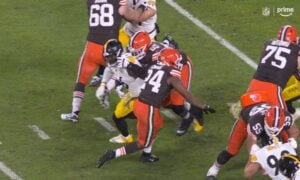Pittsburgh Steelers owner Art Rooney II acknowledged the obvious on Monday when he called RB Najee Harris’ fifth-year option a “key decision”. Teams must elect to exercise a player’s fifth-year option after the end of the player’s third season for former first-round draft picks still on their rookie deals.
Harris became the first player in team history to rush for 1,000-plus yards in each of his first three seasons. He has been consistently productive with seven or more rushing touchdowns each year. The former Alabama standout is also chronically available. The fact is he has never missed a game. That’s a valuable trait to have in a running back.
“A lot of thought and a lot of analysis goes into making those decisions”, Rooney told Steelers Radio Network’s Rob King in a one-on-one interview for the team’s website, discussing Harris’ fifth-year option. “We’ll be working on that, as well as all of the other things that we have to do in the offseason. But that’ll be a key decision as we get closer to the draft in May”.
On the whole, nobody has given much of a committed answer to the question. Head coach Mike Tomlin largely avoided it when asked about Harris’ fifth-year option. Instead, he focused on his play, describing him as “really solid”.
His fifth-year option value is projected to be $6.6 million based on his playing time over his first three seasons. One thing the Steelers might consider is the cost of retaining RB Jaylen Warren in 2025.
Warren, a former college free agent, signed a three-year contract when he initially joined the team. Drafted players who sign four-year contracts and remain under contract never face restricted free agency. But as a former college free agent, the Steelers would have to tag him at a higher level.
The lowest restricted free agent tender is known as the right of first refusal. Any team can sign that player to an offer sheet; the original team either then matches the offer or refuses it, taking as compensation the equivalent draft pick with which that player was selected. College free agents yield no compensation because they signed without a team drafting them.
To protect against that, there are first- and second-round tenders. A player signed to a second-round tender regardless of draft status would yield a second-round pick in compensation. But it costs more. By 2025, it is likely to be nearly $5 million.
Of course, as with Harris, the Steelers could lower their running backs’ respective cap hits by signing them to extensions. But for Rooney and the Steelers, the decision is a significant one; Harris’ fifth-year option becomes guaranteed as soon as they exercise it.
It is more common in recent years for teams to opt not to pick up a player’s option and yet end up re-signing them. But at the moment, I am leaning toward the Steelers picking up the option. They still have a few months to decide.








